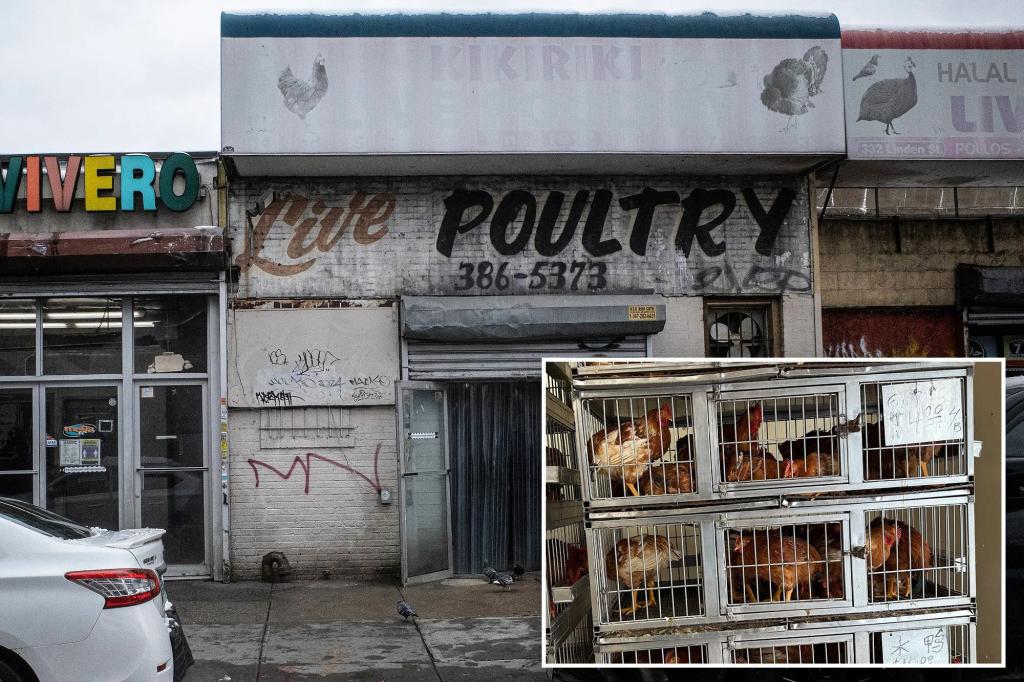World
Activists accuse NYC shops of selling ‘sickly’ chickens in scramble before bird-flu shutdown

The Avian Flu Crisis: A Call for Immediate Action
The recent outbreak of avian flu in New York has sparked widespread concern, not only for the health of the birds but also for the safety of the public. Animal activists have sounded the alarm, accusing several live poultry markets in Brooklyn and Queens of selling sickly-looking chickens as they rush to clear their inventory before a state-mandated shutdown. These markets, including TIBA in Ridgewood, Kikiriki Live Poultry, Inc., and Pio Pio Poultry in Bushwick, have been criticized for keeping birds in overcrowded and unsanitary conditions, raising fears of a public health crisis.
Sick Birds and Overcrowded Cages: The Disturbing Reality
Disturbing images shared by the animal advocacy group NYCLASS reveal the shocking conditions in these markets. At TIBA, three Cornish cross-breed chickens were found with significant feather loss and visible signs of illness. Edita Birnkrant, the executive director of NYCLASS, suspects that many of these birds may have avian flu, though no positive tests have been confirmed. She emphasizes that the lack of comprehensive testing is a major concern, with only a handful of birds tested out of thousands sold weekly. The images also show chickens crammed into overcrowded cages, with some appearing to be on the brink of death. Birnkrant argues that the conditions in these markets are not only cruel but also pose a serious risk to public health.
Government Response: Too Little, Too Late?
In response to the growing crisis, Governor Kathy Hochul issued an executive order requiring all live poultry markets in New York City, Long Island, and Westchester County to temporarily shut down until February 14. Markets with confirmed cases of bird flu were ordered to depopulate, sanitize, and reopen only after passing inspections. Those without confirmed cases were instructed to sell off their inventory by Monday and remain closed for at least five days for disinfection and inspection. However, activists like Birnkrant argue that this shutdown is far too late and insufficient to address the problem. She warns that reopening the markets in just five days will allow the cycle of infected birds from factory farms to continue, putting both animals and humans at risk.
Markets Scramble to Comply Amid Rising Concerns
As the shutdown deadline approached, the affected markets scrambled to comply with the state’s orders. TIBA in Ridgewood was closed by Sunday, with empty cages and a sign indicating it would reopen on February 14. Pio Pio Poultry was also closed to the public, with workers hosing down the store and directing the runoff into the street. Meanwhile, Kikiriki Live Poultry, Inc. in Bushwick remained open on Sunday, with workers reporting increased business since the executive order was announced. The store’s inventory of dozens of live chickens was expected to be sold off by the end of the day, with plans to reopen on February 15. However, a worker at Kikiriki revealed that the store does not test its flock for bird flu, relying instead on farmers and state inspectors. This lack of proactive testing has raised further alarms among activists.
A History of Neglect and Warning Signs
Kikiriki Live Poultry, Inc. has a history of issues, having received a warning notice from the USDA’s Office of Investigation, Enforcement and Audit in October 2022. The exact violation was not disclosed, but Birnkrant pointed out that watchdogs had previously found a chicken at the establishment with a bloody wound “down to the bone.” These findings highlight a systemic problem of neglect and poor conditions in live poultry markets. NYCLASS has documented similar issues in the past, including overcrowded cages and birds being cannibalized due to stress and poor living conditions. The current crisis has brought these issues into sharp focus, with activists arguing that the markets are inherently inhumane and dangerous.
The Broader Implications: Public Health and Animal Welfare
The avian flu outbreak has far-reaching implications, both for animal welfare and public health. As of Thursday, there were 67 confirmed cases of bird flu in humans in the U.S., with over 150 million poultry and nearly 960 dairy herds affected. The New York City Health Department has urged individuals exposed to sick birds to monitor for symptoms, which can range from mild flu-like illnesses to severe respiratory diseases. The crisis has also drawn attention to the broader debate over live animal markets. Critics like Queens City Council member Bob Holden argue that these markets should be banned altogether, citing both the cruelty to animals and the public health risks they pose, especially in densely populated urban areas.
A Call to Action: The Need for Permanent Change
As the situation continues to unfold, activists and officials are calling for immediate and lasting action. Birnkrant warns that unless live poultry markets are permanently closed, the cycle of sickness and neglect will continue. “Nothing will have changed,” she says, when the markets reopen next week, predicting that they will restock with sick birds from the same factory farms. The avian flu crisis has exposed the vulnerabilities of these markets and the risks they pose to both animals and humans. It remains to be seen whether the state will take stronger measures to address the issue, but one thing is clear: the status quo is no longer acceptable.











